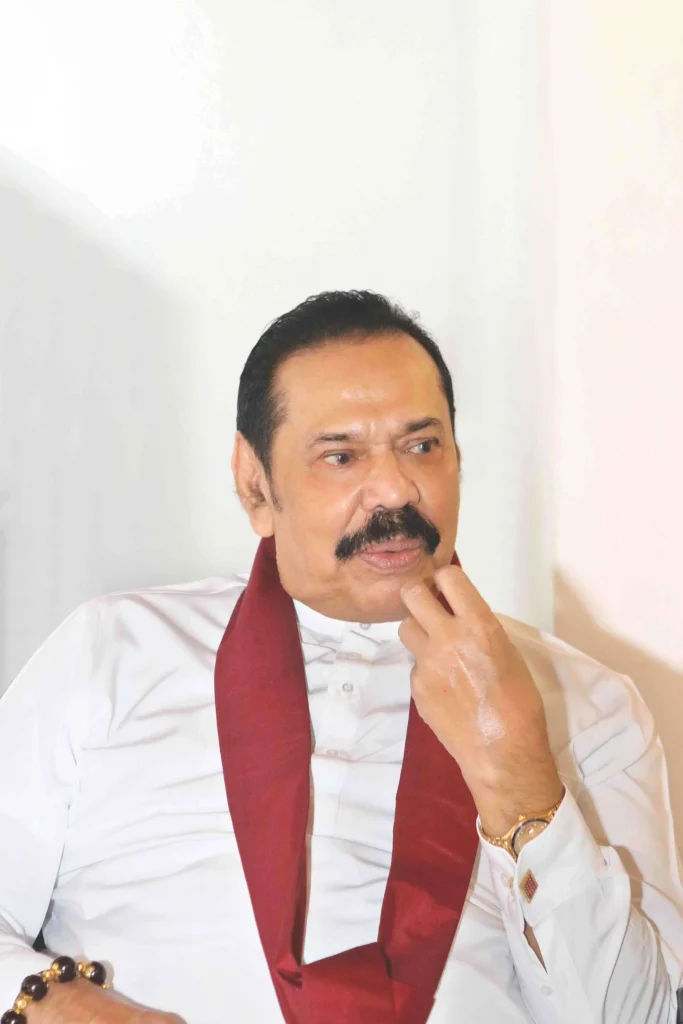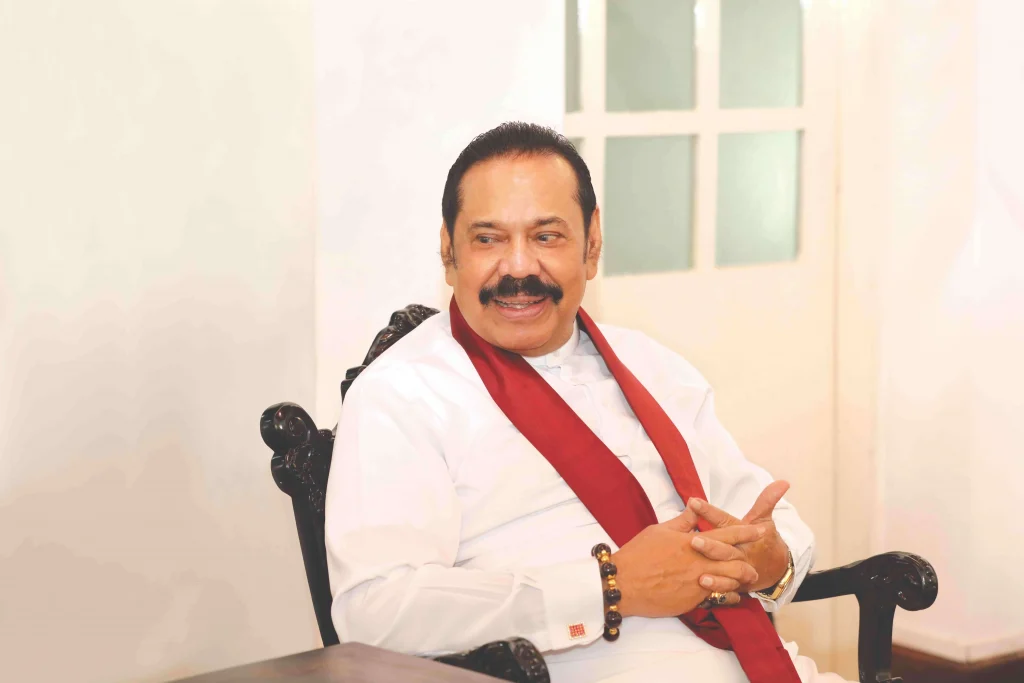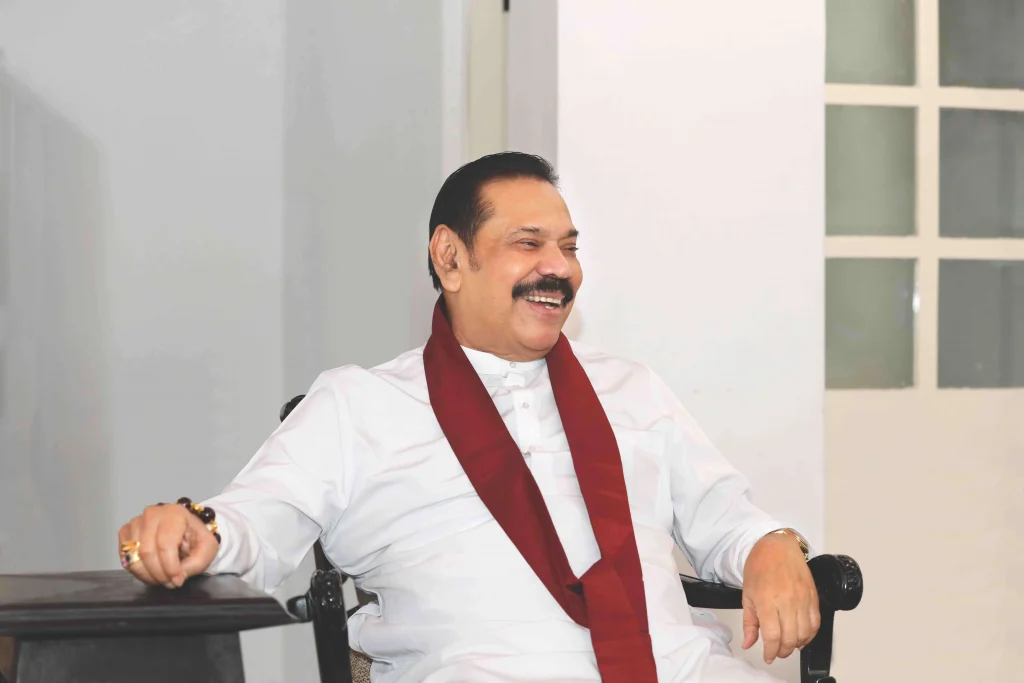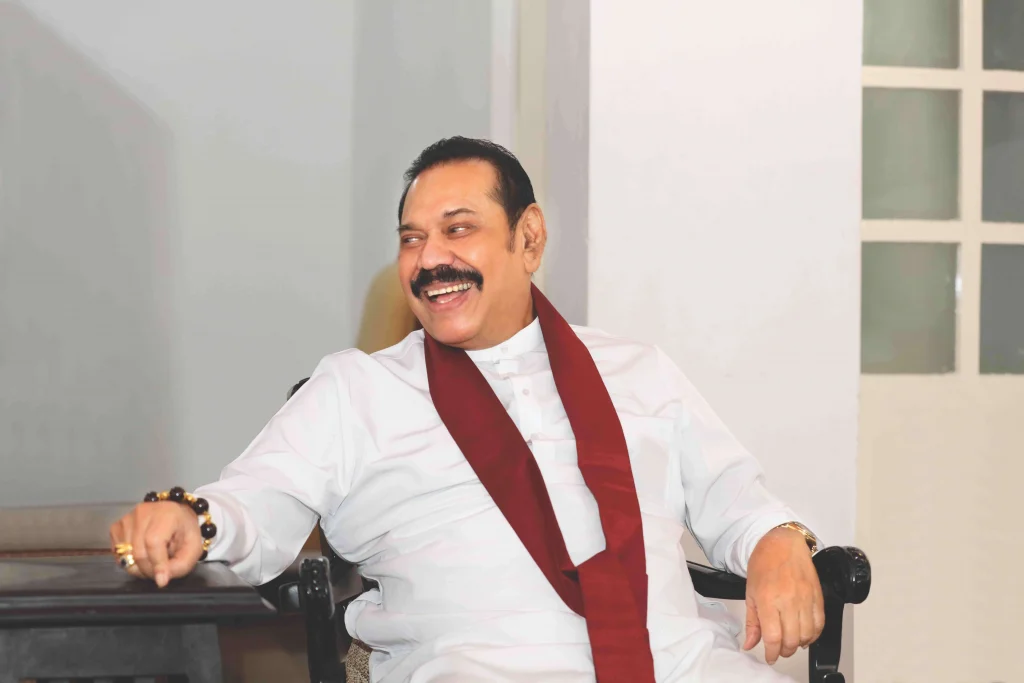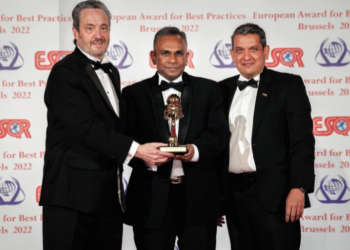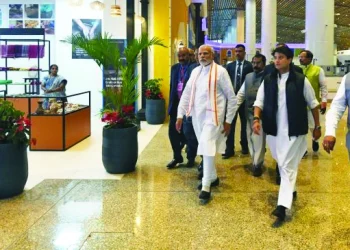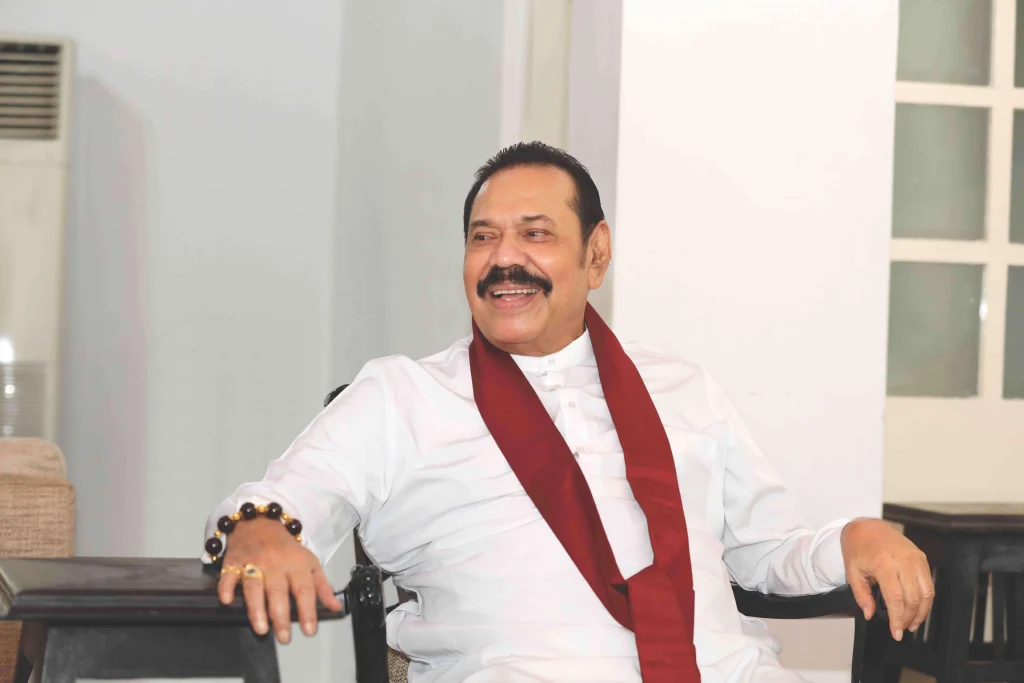
Mahinda Rajapaksa is the leader extraordinaire for some. He is also a leader who has been praised and riled against in equal measure. Love or hate him, he still retains a following and probably has a prominent place in many people’s hearts. The youngest member of Parliament in 1970, MR as he is popularly known, has breathed politics all his life. It all started under the tutelage of his father and uncles, political luminaries of the deep south. He made his Parliament debut during the stewardship of Sirimavo Bandaranaike. Since then, he has worn many hats on both sides of the aisle. He is a politician who gradually rose through the ranks. He appreciates his hard-fought journey as one of learning, whether in Government or Opposition. His best years of visibility came from years in Opposition, where he became pivotal in mobilizing public activism. He is hailed for his leadership in ending the three-decade war and the development that followed in the country that allowed the private sector to accrue the benefits of a stable operating environment and be partakers in the growing construction, tourism, and manufacturing sectors. Today, Mahinda Rajapaksa says that he is a man without power but still believes in uniting all factions for the sake of the country. Still a staunch nationalist at heart, Mahinda Rajapaksa is a firm believer in the power of the State to serve the needs of the public. In contrast, balancing the public and private sectors is vital for nation-building to accrue the best of both, he says. Speaking to Business Today, Mahinda Rajapaksa acknowledges that the country is in one of its worst economic downturns and believes unity of purpose will get the country through it all.
Words: Jennifer Paldano Goonewardane.
Photography: Sujith Heenatigala and Dinesh Fernando.
You are known as a politician who rose the ranks and navigated the pitfalls. People acknowledge you as the leader who changed the country’s circumstances following your ascendency to the presidency when you gave leadership to end the conflict. After many years, looking at today’s political landscape, how do you see the young and new politicians fighting for power, wanting to climb the ladder of leadership in a short period, and looking for shortcuts to do so?
It’s natural to want to climb the power ladder. Unlike our times today, young politicians want to do it sooner. At the same time, the desire to reach the top and reach it faster is a human trait. However, in politics, I see that tendency, the lack of patience to wait for your turn to learn, whether in government or the opposition, as a problem pervading today’s political landscape.
As for me, I didn’t seek the top when I entered politics. However, I worked under whatever position and circumstances. I was always with the people. Being ambitious is all right, but you must work hard to realize your ambitions. Otherwise, it’s futile because you can only reach the next level if you work for it. As a politician, one must work sincerely among the people without ulterior motives or ambitions. If you do so, the people will elevate you to the top. For instance, when we worked to bring Anura Bandaranaike eventually someday as the next leader of the SLFP, it pushed us into the limelight and to the top. That was not a conscious effort on my part to seek attention but because I worked hard and sincerely that my potential shone through those burgeoning years.
I started as one of the youngest individuals appointed to Parliament from Beliatta in 1970 at 24. I spent those seven years in Government learning without being given or me demanding a portfolio. But for me, it was an excellent opportunity to learn as a young politician. I have been in the Opposition for many years as well. When I lost my seat in 1977, I didn’t hang my boots or take a back seat from public life. My loss was only a minor setback. It was the beginning of a new phase in the SLFP when we began working to resurrect the party to ensure future victories. We focused on changing course so that, eventually, we could come into Government. We worked at improving our prospects as an Opposition and were in no hurry to rush to grab power.
We organized many people’s movements, such as the Pada Yatra, Jana Gosha, and Minis Damwel agitations, where we, as an Opposition, mobilized the people against the wrongs of the Government in office, which propelled us to the top as our popularity soared. Our activism exposed our potential as leaders, as politicians who could execute. However, today many in politics desire power and positions and to reach the top without investing much. Young politicians should work harder to realize their political ambitions. They must be innovative and creative and offer people something new and different.
Why is everyone banking on your image to come to power and remain in power? Haven’t you been the crowd-puller of every alliance?
The fact that people like me and my appeal among the masses is not something I do deliberately. I don’t consciously invest in creating a persona among the people or generating a following. It comes naturally to me. After all, politics is in my body. So, when I go before the people, I don’t have to make an extra effort or put on a guise to be seen. I dedicated my entire adult life to politics. I have strived to work and interact with different groups of people in my long political career, and one such group has been the trade unions. The best time an aspiring politician can build his career and prospects is while in the Opposition by demonstrating his prowess in mobilizing the people. In Government, there’s a lot of competition among peers to outshine and beat one another while serving in different portfolios. There’s also a race to get plum jobs in Government. But the spotlight naturally falls on you when you fight in the Opposition, propelling you into prominence. And that’s what happened to me, which was not a conscious effort I made to elevate myself as the superstar of any political movement. It came naturally as someone whose whole life has been in politics.
Now that the SLPP has had to change course and work under new leadership, what is your opinion of the new journey that you have undertaken?
When Ranil Wickremesinghe entered Parliament post-2020, he was the sole member of his party in Parliament. Now that he is the President, he has mapped out a path for his Government with a selected team. The SLPP supports his plans for the country because we know the people’s suffering under the current circumstances. If we are genuine in our desire to help our countrypeople rise above the current situation, we have to throw our weight behind the President’s plans and policies. Some within our party have differences in opinions, a mix of members for and against our stance. The need of the hour is to think of the issues impeding the progress of our country. There are better times to pull in different directions.
The economic collapse is the culmination of decades of financial woes that the country has been battling, finally exploding in 2022. The climax of the economic problem has exploded exponentially, affecting all sectors, and a government cannot resolve such a reality in the immediate term. It has to be a gradual process of rebuilding the economy, which takes time. The economic fillip from 2005 to 2015 trickled down to the people. When we came to power in 2005, we managed to end a 30-year war in two and a half years. Had the earlier leaders focused on ending the conflict 30 years prior, we would have been at a very high stage of development, and the situation we’re facing today wouldn’t have come to pass.
The country has been experiencing many street protests of late. What have you to say about that?
Today people are protesting because we have created an enabling environment by investing all our strength and resources to end the conflict after 2005. In a way, the people are protesting because the war headache is no longer looming over them as they have the freedom of movement. Now that it’s been more than ten years since the war ended, most young people have vague memories of those bleak war days. They have forgotten the economic hardships. They need to remember the lack of food and essentials. The fear of bombs exploding haunted people whenever they left their houses. How many lost their lives in vain due to the conflict? But all that’s forgotten today. Today the new struggle is for rights. At the same time, no government should dismiss the new slogans and struggles. As societies evolve, new phenomena emerge that a government must be aware of and be ready to resolve. When new people’s movements occur with new grievances, any incumbent government should take stock of their protests, listen to them, and negotiate with agitating groups. People’s protests started when the leadership failed to resolve their grievances as their circumstances worsened daily, and their frustrations spilled over to reach a climax. It was a leadership problem. Those who came to power needed the foresight to resolve the issues head-on.
What do you have to say about people complaining that Sri Lanka’s development not being on par with other countries’ grand ambitions?
Our forward march or development trajectory should not be like Singapore or Dubai because those societies and their cultures differ. Sri Lanka is a country that has embraced its roots and its culture every step of the way. Our 2,500 years old history and the culture it spurred have always been a cornerstone of our lives. We have been a very developed society since ancient times. We have remnants of grand structures that speak of our level of development. The kings built structures like the nine-storied Anuradhapura Lovamahapaya because we had the strength and the know-how. We cannot abandon our history when we speak of our future and map our future as a country. Our story should be unique, and our future path should be cognizant of our history and culture. We cannot copy someone else’s development journey.
You spoke about some people in your party being on board while others aren’t. You have been the perennial peacemaker between dissenting groups. Is there anything you can do to bring everyone together?
It’s high time that all factions unite for the country’s sake. I cannot do that any longer because I have no power. Someone has to step in to bring the sections together to build a united front. The ideal individual or individuals who could do that are those who are in power. No one should fool themselves that they can go on their journey alone. Now is not the time for power struggles. The need of the hour is for unity, and the only individual capable of inviting the different factions to the negotiating table for the country’s sake is the leadership. Those in power should listen to the people’s voices and abandon their agendas and pettiness to unite with their political teammates to go on a united journey for the country’s sake.
Why has it been impossible in Sri Lanka to bring political unity? We have only seen it collapsing every time there’s been an effort to get a united front for political stability.
It boils down to the motive of power. The desire for power is universal. The desire for power is what drives everything in every country. The desire for power and power grab is why political factions and parties fail to unite in navigating the country forward and bringing it out of its current predicament. Right now, Sri Lanka is going through a power struggle, with one trying to outdo the other to come to power, like a battle to be the next President, the next Prime Minister or minister, or to get the finest portfolio.
What do you think of individuals who made their political debut because of your endorsement? Many of them have broken away or joined some faction today.
None of them could indeed have made it on their own as independents. Their strength was the political party or alliance from which they sought the people’s mandate. It’s also true that many of them came to power because of my endorsement. But once they’re in control, it’s natural for them to forget their beginnings and those who supported them to succeed. Their powerful position, once they win, blinds them from acknowledging what and who brought them to power. It’s human nature to forget fast and ignore those who helped you along the way. Quite often, people forget that their strength and the road to power were an amalgamation of the party and the people, but it’s human nature to believe they came to power on their strengths. When a particular party is strong, any potential candidate aligned with that party has an advantage because the people choose the candidate based on the strength and popularity of the party they are representing.
The minority issue has been a continuous cause of bickering between parties. What do you think of that? We cannot consider the northeast a separate entity requiring special treatment. The problems faced by the farmer in the northeast are the same problems facing the southern farmer. Likewise, the issues of the working people in the northeast and the south are similar in magnitude. We should look at any resolution to the problems of minorities from that standpoint. We should not look at issues in isolation. We are a single country where its people face similar problems in whichever part of the country. People’s issues should be considered collectively and not in isolation. We cannot please one and not the other. Every individual has a problem that requires resolution. None should forget that the war ended and opened new opportunities to the northeast people, including the freedom to do business and new opportunities in tourism. Their economic opportunities and circumstances improved by leaps and bounds following the conflict ending in 2009.
Businesses couldn’t thrive when there was a war in the country. The conflict impeded the tourism industry’s progress, and the conflict’s uncertainty didn’t augur well for businesses. Ending the war was the beginning of Sri Lanka’s development. We opened a new development chapter in the country. We made tremendous changes to the country’s development landscape which is to be seen even today by connecting people through infrastructure development.
It’s natural to want to climb the power ladder. Unlike our times today, young politicians want to do it sooner… As a politician, one must work sincerely among the people without ulterior motives or ambitions. If you do so, thepeople will elevate you to the top.
What you say your Government built following the war seems to have collapsed in a few months. Aren’t we worse off today economically than during the war?
Every political party that comes to power has the best interest of the people and the country at heart. But why they succeed or fail depends on their plans and strategies. The problem is that as parties and alliances come and go, their political leanings and ideologies also differ and that results in altering the economic course that the country has been following. Suddenly the new government obliterates the policies and development agenda of the earlier government and embarks on implementing new plans. Such changes every few years have been happening to Sri Lanka’s detriment.
Every political party has had a different approach to dealing with the country’s sectors. Some political parties have overconfidence in the private sector. I believe in balancing a government’s dealing with the public and private sectors. We demonstrated that in our dealings while we were in power. We strengthened the public sector during our Government and maintained excellent relations with the private sector. The private sector thrived in its domains of business. We have to balance the type of businesses spread between the two, such as confining some to private and specific others to the Government. It should be the duty of the State to supply certain public services. Privatizing such services will not serve the purpose of these sectors in the first place. Despite the current dilemma of whether we should restructure State Owned Enterprises, and where required, we could introduce specific changes, people’s basic requirements should be the purview of the State. Who will take responsibility if a privatized essential service faces disruptions to its continuous supply?
No one should fool themselves that they can go on their journey alone. Now is not the time for power struggles. The need of the hour is for unity, and the only individual capable of inviting the different factions to the negotiatingtable for the country’s sake is the leadership.
But don’t you agree that the public sector is ailing and adding to the country’s burden?
The problem is that the public sector has been the perpetual go-to place to resolve unemployment in the country. Individual qualifications and suitability in filling vacancies matter very little. And that’s the reason we find employees in government offices idling. There needs to be a strategy to resolve unemployment. We have been applying stopgap measures to quell the agitation of the unemployed. Sadly, graduates had to fill clerical vacancies because they needed more relevant vacancies to suit their qualifications in the government sector. Such ad hoc remedies have robbed the country of harnessing such educated individuals’ potential for the country’s benefit. We should have a system that recruits people according to their qualifications and job requirements so that their productivity will be sufficient and the country will benefit from their work.
Of course, the overall problem lies with the education system that ill prepares them for the job market requirements. Combined with that shortcoming is the politicians’ practice of providing jobs to appease the agitation of the unemployed in their electorates. In the west, graduates don’t demand that the government give them jobs. It’s up to individuals to find employment. Like in other countries, we should work hand in hand with the private sector to generate employment opportunities for young people. Unfortunately, we have created in our country a dependency system where young people and graduates have to pursue a member of parliament to get a job. On a Sunday, when politicians meet the people of their electorates, the majority come asking for jobs. It has been the practice of every Government to create jobs in Government to give to the unemployed no matter their usefulness and benefit to the country. That has been a bane to Sri Lanka.
What do you think of the so-called progressive 2023 budget that proposed revisions and tax reforms?
How can a country develop without charging taxes? Every profit-making entity should be taxed. But I don’t endorse imposing taxes on the public. Rather than taxing the working people, it’s right to impose taxes on corporate profits. Taxing is vital in the future because without the revenue from taxes, how can a government provide the people with basic amenities and public services? Today, people lament that the Government is imposing new taxes and increasing existing ones.
At the same time, when the earlier Government also reduced taxes, people blamed them for making a wrong decision. No one can deny that my Government provided for the people sufficiently from 2005 to 2015. We had an excellent tax regime while businesses made good money, and the public sector was able to provide services to the people. Of course, our present problems are a culmination of long-term mismanagement. It’s been brewing for the past 70 years, only to explode recently. We have to impose taxes under the current circumstances, and only then can the State continue some of those welfare programs for the neediest in the country. We must balance taxing and welfare programs because the State is responsible for some groups of people by extending welfare benefits. That cannot happen in a vacuum unless a government has sufficient revenue to implement them. Therefore, a country should have an effective tax regime that is fair and does not burden the working people.
Like in other countries, we should work hand in hand with the private sector to generate employment opportunities for young people. Unfortunately, we have created in our country a dependency system where young people and graduates have to pursue a member of parliament to get a job.
What is your future course?
As a party, we must choose a new path as we move forward. What’s essential is exploring what we can do better to continue our journey of serving the people and creating a law-abiding and lawful country. Our focus will be on engendering a people who will honor and accept our policies. We should rebuild our society into one of strength and confidence.
